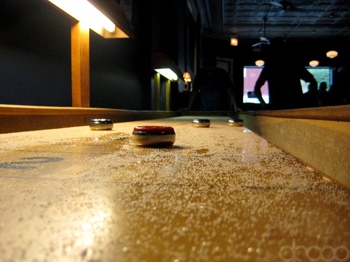Foodie Rant: Against "Against Mixology"
By Roger Kamholz in Food on Jan 14, 2011 8:00PM
 Author Sarah Deming is bothered by "mixology." She says so in the winter 2011 issue of literary magazine The Threepenny Review. She argues that the term has come to stand for a series of affronts and frippery she's suffered in innocent pursuit of her "usual" drink. I feel Sarah Deming's pain, as I too am bothered; but in my case, it's this essay of hers that has me pissed.
Author Sarah Deming is bothered by "mixology." She says so in the winter 2011 issue of literary magazine The Threepenny Review. She argues that the term has come to stand for a series of affronts and frippery she's suffered in innocent pursuit of her "usual" drink. I feel Sarah Deming's pain, as I too am bothered; but in my case, it's this essay of hers that has me pissed.
Lately, several close observers of the craft-cocktail world have either noted or called for a shift in the way mixology is practiced. They're saying that craft bartending has reached a Baroque high-water mark, and that 2011 will be the year that the trend begins to ebb toward simpler drinks, fewer ingredients and a greater attention paid to balance. (See Chicago bartender Todd Appel's recent blog post as evidence.) But Deming's polemic is quite different from those constructive criticisms. After some very unfortunate experiences, she aims to indict the entire culture of mixology.
Among other complaints, Deming informs us that "The Midwest could use a little cocktail education." I'll debunk that absurdity later. (Besides, plucking that line out of context, albeit a doozy, isn't sporting.) First, a summary: Deming is fed up with not only the term mixology but also the detriment to social life in general, and hers in particular, that mixology has apparently caused. (Remember the "war on foodies"? This is not much different.)
"One gray happy hour you will go to your clean, well-lighted place to find the windows boarded up, the address obscured by a skull and crossbones, and the name changed to something like The Pharmacist's Revenge," she writes. "The horrible, sinking feeling in your stomach is called 'mixology.'" She instructs readers on how to navigate this dark and unfamiliar jungle ("act listless and bored"), then helps us to identify our enemy: "Behind [the bar] stands the man whose sole purpose in life is to keep you from your drug of choice. He is probably a white male in his late twenties with a handlebar moustache, mutton chops, or pubo-Amish beard. He dresses like a member of a barbershop quartet."
Deming goes on to recount taking her father to a New York bar. "In his broad Oklahoman accent, he ordered an Amaretto sour," she writes. Their server turns out to be a condescending douche, and the subsequent exchange tarnishes Dad and daughter's opportunity to reconnect. "He felt like a hick, and I felt like a jerk for exposing him to such unkindness."
I'm no apologist for mean servers and bartenders; I agree with Deming that snide remarks, elitism and exclusion have no place in modern bars. Those incidents are regrettable, but are they representative? Personally, I've never been the victim of any of those things at a Chicago bar trafficking in mixology. I suppose, then, we are just lucky here - certainly not because we exist in blissful ignorance of any "cocktail education" altogether, but rather because here, the culture of mixology comprises people, places and beverages that celebrate creativity, invention and camaraderie. Do evil mixologists lurk in Chicago? If so, I haven't met them.
Visit, Sarah Deming. We could go to Weegee's Lounge and enjoy a perfectly made Sazerac over a game of tabletop shuffle board. No pretension there. Or hear a rock show at the Whistler while sipping fantastic cocktails for just eight bucks. Or visit mixologist Lynn House, who - despite not being white, male or mustachioed - has risen through the ranks and now heads the stellar cocktail program at Blackbird.
Deming wants us to accept that drinking is pure sin - no matter how foppishly it's attired. Therefore, to treat craft-cocktail-making as art and its practitioners as artists is somehow false, misguided and undue praise. And to grant them their eccentricities of dress and facial hair? Well, that would be an invitation to let them run rampant.
I'd argue that, like art, a good drink can be intriguing, mystifying, maybe even challenging. The best art doesn't just call for the viewer's attention and open mind; it also expects you to bring something of yourself to the table - be that curiosity, intellectual effort or a willingness to step beyond your comfort zone. "Mixology" is not a passive experience - it wants you to be engaged; it wants the most of your senses. Eccentricity, "secret" entrances and silly 'staches are just part of the fun. If you want a regular drink at a regular bar, both remain readily available; as she points out, mixologists are but a "lunatic fringe." TVs and BL Lime are not going away.
Weegee's shuffleboard table photo by DR000.